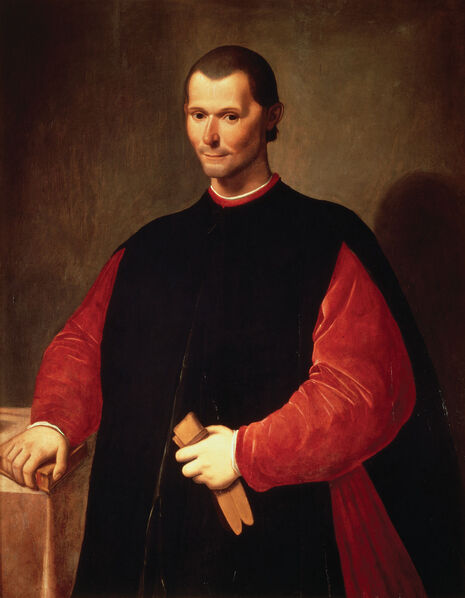The Prince is back and he’s not going anywhere
2016′s Machiavellian politics is all proving too much for squeaky-clean fresher columnist Martha O’Neill

As the summer of 2016 draws to a close, it is perhaps a pertinent time to consider what we have learned during the turbulent and febrile political climate of recent months. From the Conservatives' momentous change of leadership and the Messianic re-crowning of Jeremy Corbyn, to the devastating social repercussions of Brexit, it could be said that, of late, British politics has been in a state of flux.
I, too, have found myself in a state of emotional flux. Term starts in less than two weeks, and I don't think I've ever been more terrified or excited in my life. Well, except maybe that time I opened the car door in the lion enclosure at Longleat (true story, but I lived to tell the tale). With such ambiguity comes a sense of insecurity (am I doing the right thing? Am I good enough? Will anyone like me?). British politics is itself open to such insecurities, with opportunistic individuals asking themselves not 'am I doing the right thing?' but 'am I doing the right thing for me?'
Over the past few months, we have seen politicians attempt to 'climb the greasy pole', – but without the charismatic charm of the dapper Disraeli. It could be said that all great political minds have one thing in common – a desire to win. However, when does the concept of winning instead morph into the desire for self-gain? Machiavelli once wrote that "A wise lord cannot, nor ought he to, keep his promises", and 2016 has certainly provided a great case-study of the existence of dishonesty within British politics.
Let's first consider Brexit, the full-scale effects of which are not yet known. What we can assess is the way in which the country got to its 'out' decision. You guessed it, such a decision was based on... political duplicity. From promising £350 million for the NHS, to matching agricultural funding and 'closing the borders,' the Brexit narrative proved to be rooted in fantasy and an ideology devoid of fact and truth (e.g. remember the whole misshapen banana thing? – just weird). Vilification and a willingness to blame others for the country's problems were central to the Brexit win. The EU referendum demonstrated the lows that politicians, on the right in particular, were willing to stoop to as a means of advancing their own careers. However, Machiavelli may be proved wrong in assuming that this was a 'wise' thing to do – please see Gove and Johnson for further evidence.

This underlying political dishonesty is not simply confined to the right of British politics. It is possible to observe such behaviour within the hard left also. Consider Jeremy Corbyn, whose supposed commitment to the EU left a lot to be desired. Even more recently, Traingate perhaps demonstrated the clear presence of mendacity within British politics – but it also exemplified that the art of deceit must be mastered if it is to provide any form of political advancement. Even after his success in the recent leadership contest, Labour still finds itself behind in the polls. Thus, we can perhaps conclude that, once again, those who lie are not necessarily 'wise'. (I paraphrased this on my Twitter account: The Supreme Leader's minions were not best pleased).
Most frightening, however, is the paradoxical nature of Theresa May's first few months of governance. She began her premiership claiming that the "government [she will lead] will not be driven by the interests of the privileged few, but by yours". Fast forward to September, and the interests of the privileged few seem to be well-catered for with the emergence of government plans to reintroduce grammar schools. This government now seems to promote segregation based on ability as opposed to the bettering of all schools. While Labour continues to be guided by Momentum (to the point of complete incompetency), May's weasel words will be but a distant memory, eclipsed by the harsh reality of her government's plans. Nice work, Jezza.
The hollowed rhetoric of the few can so often fuel distrust of all politicians, when in truth much is being done to address the apathy felt by the electorate today. Consider the new-found accessibility of MPs, who are now able to engage with their constituents over Twitter and Facebook. They are no longer abstract, intangible 'names', but rather human beings with Instagram accounts and the same vulnerability and insecurities that every individual shares. This digitalised age has allowed us to see politicians for who they really are – be it darn-right liars or hard-working parents who must console their children as the locks to their family home are changed once again. (If you've been hiding under a rock, I'm referring to my heroine Jess Phillips MP. A friend of a friend had a picture with her at conference – not that I'm fangirling or anything...).
It is clear that Machiavelli is intrinsically wrong when he assumes that "a wise Lord" (or Lady) cannot "keep his (or her) promises" and, despite the necessity of compromise, the mark of a successful politician is not their ability to engineer and exploit the public, but their ability to make a positive change and to inspire. (Wow, that got a little emotional and cheesy, didn't it?!) We should not let figures such as Boris and the Brexiteers (debut album to be released shortly) or Corbyn and his apparatchiks mar the reputation of dedicated and committed MPs who work tirelessly to better the lives of their constituents. On the other hand, those who stay true to the words of Machiavelli must be held accountable, or the horrors of June 2016 are bound to be repeated.
This Summer, British politics has far exceeded the scripted absurdity of The Thick of It, if without the polished (and gloriously blasphemous) spin of Malcolm Tucker. It has, however, highlighted the timeworn and institutionalised presence of political chicanery – which, unless addressed, will continue to fuel the apathy of millennials for decades to come. So as I venture out into the big, bad world as a squeaky-clean fresher, I'm staying true to myself. This wise lady ain't no liar (though a tad prone to hyperbole).
 News / Clare Hall spent over £500k opposing busway 24 December 2025
News / Clare Hall spent over £500k opposing busway 24 December 2025 Comment / The ‘class’ of Cambridge24 December 2025
Comment / The ‘class’ of Cambridge24 December 2025 News / Caius mourns its tree-mendous loss23 December 2025
News / Caius mourns its tree-mendous loss23 December 2025 News / Girton JCR publishes open letter expressing solidarity with Palestine25 December 2025
News / Girton JCR publishes open letter expressing solidarity with Palestine25 December 2025 Comment / Yes, I’m brown – but I have more important things to say22 December 2025
Comment / Yes, I’m brown – but I have more important things to say22 December 2025









